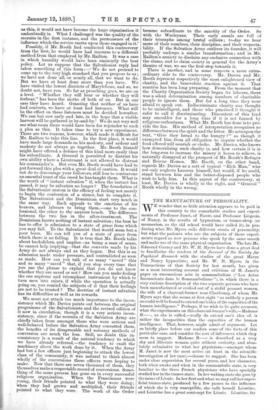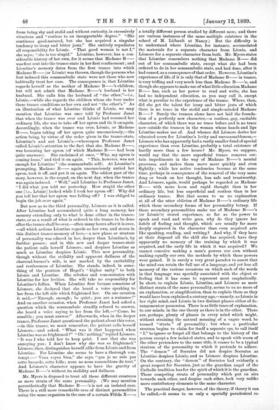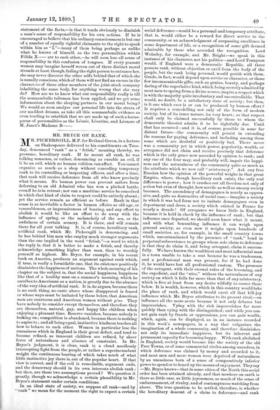THE MANUFACTURE OF PERSONALITY.
WE wonder that so little attention appears to be paid in this country to the remarkable studies and experi- ments of Professor Janet, of Havre, and Professor Liegeois, of Nancy, in the results of hypnotism, or trance-sleep (or mesmerism, as the old school would have called it), in pro- ducing what Mr. Myers calls different strata of personality, but what the patients who are the subjects of these experi- ments regard as new persons who speak by the same mouth and make use of the same physical organisation. The late Mr. Edmund Gurney and Mr. W. H. Myers have done a great deal to familiarise the readers of the Journal of the Society for Psychical Research with the studies of the great Havre and Nancy hypnotists ; and Mr. W. H. Myers, in the Transactions of that Society for last month, has given us a most interesting account and criticism of M. Janet's paper on unconscious acts in somnambulism (" Les Actes Inconscients dans le Somnambulisme "), in which there is a very curious description of the two separate persons who have been manufactured or evoked out of a stolid peasant woman, the wife of a charcoal-burner near Cherbourg, of whom Mr. Myers says that she seems at first sight "as unlikely a person as could well be found to extend one's idea of the capacities of the human intelligence." Perhaps, if we wish to be quite accurate, what the experiments on this charcoal-burner's wife,—Madame B—, as she is called,—really do extend one's idea of, is rather the incapacities than the capacities of the human intelligence. That, however, might admit of argument. Let us briefly place before our readers some of the facts of this particular case, and consider the sort of inferences which they seem to suggest. Madame B— is described as a very shy and illiterate woman, quite without curiosity, and abso- lutely submissive to what her physicians,—amongst whom M. Janet is now the most active (at least in the scientific investigation of her case),—choose to suggest. She has been under close supervision for several years, and her character, both when awake and when in the somnambulic state, is very familiar to the three French physicians who have specially studied her in the trance-state. In her waking state she goes by the name of Leonie. In her first and what we may call her super- ficial trance-state, produced by a few passes to the influence of which she is very susceptible, she calls herself Leontine, and Leontine has a great contempt for Leonie. Leontine, far from being shy and stolid and without curiosity, is excessively vivacious and "restless to an insupportable degree." "She continues good-natured, but she has acquired a singular tendency to irony and bitter jests." She entirely repudiates all responsibility for Leonie. "That good woman is not I," she says ; "she is too stupid." Leontine, however, has a con- siderable history of her own, for it seems that Madame B— was first sent into the trance-state in her first confinement ; and Leontine's memory dates from the first trance into which Madame B— (or Leonie) was thrown, though the persons who first induced this somnambulic state were not those who now habitually treat her case. The consequence is, that Leontine regards herself as the mother of Madame B—'s children, but will not admit that Madame B—'s husband is her husband. She calls him the husband of "the other,"—i.e., Leonie,—while she regards the children whom she bore under these trance conditions as her own and not "the other's." As an illustration of what Leontine thinks of Leonie, we may mention that Leontine was once told by Professor Janet that when the trance was over and Leonie had resumed her ordinary life, she was to take off her apron and tie it on again. Accordingly, when the trance was over, Leonie, or Madame B—, began taking off her apron quite unconsciously,—the action being, by virtue of the order given in the trance-state, Loontine's and not Leonie's,—whereupon Professor Janet called Leonie's attention to the fact that she, Madame B—, was loosening her apron (of which Madame B— had been quite unaware). She exclaimed at once, "Why, my apron is coming loose," and tied it on again. "This, however, was not enough for ',Confine" (the somnambulic self). At Leontine's prompting, Madame B— again unconsciously untied her apron, took it off, and put it on again. The oddest part of the story, however, is the sequel, on the next day, when the trance was again induced. "Well," said Leontine to Professor Janet, "I did what you told me yesterday. How stupid the other one [i.e., ',Collie] looked while I took her apron off ! Why did you tell her that her apron was falling off ? I was obliged to begin the job over again."
But now as to the third personality, Leonore as it is called. After Leontine had accumulated quite a long memory, her memory extending only to what is done either in the trance- state, or as a result of what is ordered in the trance to be done after the trance shall be over,—often many hours after it is over, —all which actions Leontine regards as her own, and stores in this distinct trance-memory of hers,—a new phase or stratum of personality was educed in her, deeper than Leontine's, by further passes ; and in this new and deeper trance-state the patient calls herself Leonore, and despises Leontine as much as Leontine despises Leonie. This new personality, though without the stolidity and apparent dullness of the charcoal-burner's wife, is not marked by the excitability and restlessness of Leontine. She stands, indeed, in some- thing of the position of Hegel's "higher unity" to both Leonie and Leontine. She rebukes and remonstrates with Leontine for her levities. She will take no responsibity for ',Confine's follies. When Leontine first became conscious of Leonore, she declared that she heard a voice speaking to her from the left side which frightened her. On one occasion it said,—" Enough, enough ; be quiet ; you are a nuisance !" And on another occasion, when Professor Janet had asked a question which the somnambule steadily refused to answer, she heard a voice saying to her from the left,—" Come, be sensible ; you must answer." Afterwards, when in the deeper trance, Professor Janet questioned the patient about this voice, —in this trance, we must remember, the patient calls herself Leonore,—and asked, "What was it that happened when Leontine was so frightened ?" " Oh ! nothing," replied Leonore. "It was I who told her to keep quiet. I saw that she was annoying you ; I don't know why she was so frightened." Leonore, then, distinguishes herself alike from Leonie and from Leontine. For Leontine she seems to have a thorough con- tempt :—" Vous voyez bien," she says, " que je ne suis pas cette bavarde, cette folle ; nous ne nous ressemblons du tout." And Leonore's character appears to have the gravity of Madame B—'s without its stolidity and dullness.
Mr. Myers is disposed to treat all these different creatures as mere strata of the same personality. (We may mention parenthetically that Madame B—'s is not an isolated case. There is a still more remarkable case of distinct personalities using the same organism in the case of a certain Fends X—,
a totally different person studied by different men ; and there are various instances of the same multiple existence in the school of M. Liebault at Nancy.) But the difficulty is to understand where Leontine, for instance, accumulated the materials for a separate character from Leonie, and Leonore for a separate character from both. Mr. Myers states that Leontine remembers nothing that Madame B— did out of her somnambulic state, except what she had been ordered to do in her somnambulic state, and had done, after it had ceased, as a consequence of that order. However, Leontine's experience of life, if it is only that of Madame B— in trance, is very trifling and very much less than Madame B—'s, and though she appears to make use of what little education Madame B— has, such as her power to read and write, she has had no independent education, as you may call it, except what is peculiar to the experience of the trance. Where, then, did she get the talent for irony and bitter jests of which there is no trace in the stolid and simple-minded Madame B— P Surely the trances alone have not laid the founda- tion of a perfectly new character,—a restless, gay, excitable character, of which there was no trace before and is no trace now outside the trances in the woman whose hands and lips Leontine makes use of. And whence did Leonore derive her educated scorn for Leontine's levity and unreasonableness,— Leonore who has apparently had a vastly smaller fund of special experience than even Leontine, probably a total existence of hardly more than a few hours ? Mr. Myers, we suppose, would say that the more superficial trance removes cer- tain impediments in the way of Madame B—'s mental processes, and makes them move more quickly and even flightily; while her active tendencies become at the same time, perhaps in consequence of the removal of the very same drag or break on her thought, less safe and trustworthy. And Leonore, again, would perhaps be regarded as Madame B— with more keen and rapid thought than in her ordinary life, but less superficial and restless than in her ordinary trance. But that seems to us no explanation at all of the utter oblivion of Madame B—'s ordinary life which these secondary forms of her personality betray. If these secondary personalities make use of Madame B—'s (or Leonie's) stored experience, so far as the power to speak and read and write goes, why do they ignore her habits of feeling and thought, which are , usually far -more deeply engraved in the character than even acquired arts like speaking, reading, and writing ? And why, if they have at their disposal all the skill she has acquired, have they apparently no memory of the training by which it was acquired, and the early life in which it was acquired We cannot conceive making a man's powers our own without making equally our own the methods by which those powers were gained. It is surely a very great paradox to assert that the mind can retain the full use of a language, and yet lose all memory of the various occasions on which each of the words in that language was specially associated with the object or feeling that it has come to represent most emphatically. In short, to explain Leonie, Leontine, and Leonore as mere distinct strata of the same personality, seems to us no more of an explanation, or simplification, than to explain them as they would have been explained a century ago,—namely, as Leonie in her right mind, and Leonie in two distinct phases either of de- rangement or possession. There is as little trace of explanation, to our minds, in the one theory as there is in the other. There are, perhaps, plenty of phases in every mind which might, without straining the natural meaning of a vague word, be termed " strata " of personality; but when a particular stratum begins to claim for itself a separate ego, to call itself "I," to ignore or forget all that belongs to the history of the person except a few isolated states, and to speak with scorn of the other pretenders to the same title, it ceases to be a typical stratum of the personality to which it pretends to adhere. The " demon " of Socrates did not despise Socrates as Leontine despises Leonie, and as Leonore despises Leontine. On the contrary, the " demon " of Socrates had evidently a great respect for Socrates, just as the guardian angel of the Catholic tradition has for the spirit of which it is the guardian. These competing strata of personality which put on airs towards each other, and despise each other, look very unlike mere contributory elements to the same character.
The practical danger, however, of the theory, if theory it can be called,—it seems to us only a specially paradoxical re-
statement of the facts,—is that it tends obviously to diminish a man's sense of responsibility for his own actions. If he is encouraged to believe that his ordinary consciousness is but one of a number of equally rightful claimants to the right to speak within him as "I,"—many of them being perhaps as unlike -what he knows of himself, as the two personalities within Felicia X— are to each other,—he will soon lose all sense of responsibility in this confusion of tongues. If eveiy peasant woman may imagine herself woven out of three distinct moral strands at least, though, failing the right person to entrance her, she may never discover the other selfs behind that of which she is usually conscious, which of them will not find an excuse in the characters of these other members of the joint-stock company inhabiting the same body, for anything wrong that she may -do P How are we to know what our responsibility really is till -the somnambulie talisman has been applied, said we get some information about the sleeping partners in our moral being ? We would as soon analyse our personal life into the strata of our maddest dreams, as take all this sorunambulic evidence as even tending to establish that we are made up of such a hams- pouts of personalities as the Leonie, Leontine, and Leonore of M. Janet's Madame B—.








































 Previous page
Previous page